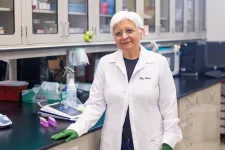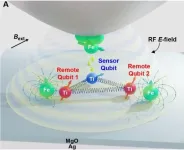(Press-News.org) In this Special Issue of Science, three Reviews highlight how recent advances in the field of ancient DNA have greatly advanced our understanding of the evolutionary history of many plants and animals, including our own species. “This special issue examines the changing landscape of how ancient DNA (aDNA) is studied today, including previously untapped sources, improvements in technology, and ethical challenges, and what we’ve learned about ourselves though ancient DNA,” write Corinne Simonti and Madeleine Seale, associate editors at Science.
In one Review, María Ávila-Arcos and colleagues discuss the significance of aDNA in addressing non-European regional questions. According to the authors, much of the early human aDNA research was focused on large-scale events, such as continental-scale population migrations or genetic admixture events, with an overrepresentation of European-focused studies. However, many regional questions, particularly those relevant to the Global South, remain underexplored. By reviewing several recent paleogenomics studies that have been successful in highlighting local histories and health in the Americas, Africa, Asia, and Oceana, particularly that of the Indigenous and Descendant communities that live there, Ávila-Arcos et al. underscore the importance of bringing a regional perspective to aDNA research. They further explore the ethical considerations as the field shifts towards answering finer-scale questions. When done correctly, finer-scale aDNA investigations can be a powerful tool with the potential to integrate neglected or oppressed communities and to uncover past histories that have been lost or erased from history.
Another Review, by Hernán Burbano and Rafal Gutaker, discusses the use of aDNA from herbarium specimens – historically collected and preserved plant samples – to provide glimpses into past plant communities. Such insight can provide a better understanding of the evolutionary and ecological processes that shape plants over time and could help inform new conservation efforts. In a third Review, Beth Shapiro and colleagues explore the state-of-the-art in paleogenomics techniques and discuss the key challenges that remain, including technical limitations that impede the ability to evaluate “deep-time” ancient DNA.
END
Special Issue: Ancient DNA
2023-10-05
ELSE PRESS RELEASES FROM THIS DATE:
What are the risks of radioactive wastewater release – the next of which is October 5th – from Fukushima Daiichi nuclear plant?
2023-10-05
Wastewater release from the Fukushima Daiichi nuclear plant in Japan is expected to have negligible effects on people and the ocean, Jim Smith and colleagues report in a Perspective. The planned releases of radioactive wastewater, 350 million gallons of which has been stored at the site since the 2011 earthquake and tsunami that triggered the Fukushima plant’s meltdown, began in August 2023 and are expected to continue for perhaps the next 30 years. The second release is scheduled to start on October 5th. While the scheduled releases have sparked international concern, Smith et al. discuss the science behind the risks and ...
Discovery made about Fischer Tropsch process could help improve fuel production
2023-10-05
A fundamental discovery about the Fischer Tropsch process, a catalytic reaction used in industry to convert coal, natural gas or biomass to liquid fuels, could someday allow for more efficient fuel production.
Washington State University researchers discovered previously unknown self-sustained oscillations in the Fischer Tropsch process. They found that unlike many catalytic reactions which have one steady state, this reaction periodically moves back and forth from a high to a low activity state. The discovery, reported in Science, means that these well-controlled oscillatory states might be used in the future to enhance the reaction rate and the yields of desired ...
New discovery may ‘unlock’ the future of infectious disease and cancer treatment
2023-10-05
University of Birmingham News Release
STRICTLY EMBARGOED UNTIL 14.00 Thursday 5th October ET 2023/ 19.00 Thursday 5th October UK 2023
Researchers have identified a ‘guard mechanism’ for a protein which attacks microbes in infected cells, opening the possibility of new treatments for Toxoplasma, Chlamydia, Tuberculosis and even cancer.
A study, led by the University of Birmingham and published today (5th October) in Science has discovered the lock and key mechanism that controls the attack protein GPB1. GBP1 is activated during ...
Study shows prior exposure to common virus shields against birth defects and miscarriage
2023-10-05
Researchers at Tulane University have shown for the first time that mothers are much less likely to transmit a common virus known to cause miscarriages and birth defects if they are exposed to the virus prior to becoming pregnant. The study marks a significant step toward the development of a vaccine that could protect mothers and their babies.
Cytomegalovirus (CMV) is a common herpesvirus that most women contract unknowingly before reaching child-bearing age. It's usually harmless except during pregnancy when, if passed on to the developing fetus, it is a leading cause ...
A new qubit platform is created atom by atom
2023-10-05
Seoul, Korea - Researchers at the IBS Center for Quantum Nanoscience (QNS) at Ewha Womans University have accomplished a groundbreaking step forward in quantum information science. In partnership with teams from Japan, Spain, and the US, they created a novel electron-spin qubit platform, assembled atom-by-atom on a surface. This breakthrough was published in the journal Science on 2023/10/06.
Unlike previous atomic quantum devices on surfaces where only a single qubit could be controlled, the researchers at QNS successfully demonstrated the ability to control multiple qubits simultaneously, enabling the application of single-, two-, and three-qubit gates.
Qubits, ...
Brain is ‘rewired’ during pregnancy to prepare for motherhood
2023-10-05
Francis Crick Institute press release
Under strict embargo: 19:00hrs BST Thursday 5 October 2023
Peer reviewed
Experimental study
Animals
Researchers at the Francis Crick Institute have shown that pregnancy hormones ‘rewire’ the brain to prepare mice for motherhood.
Their findings, published today in Science, show that both oestrogen and progesterone act on a small population of neurons in the brain to switch on parental behaviour even before offspring arrive. These adaptations resulted in stronger and more selective responses to pups.
It is well known that while virgin female rodents do not show much interaction with pups, ...
Vulnerability to different COVID-19 mutations depends on previous infections and vaccination, study suggests
2023-10-05
A person’s immune response to variants of SARS-CoV-2, the virus that causes COVID-19, depends on their previous exposure – and differences in the focus of immune responses will help scientists understand how to optimise vaccines in the future to provide broad protection.
A new study has found that people differ in how vulnerable they are to different mutations in emerging variants of SARS-CoV-2.
This is because the variant of SARS-CoV-2 a person was first exposed to determines how well their immune system responds to different parts of the virus, and how protected they are against other variants.
It also means that the same COVID-19 ...
The end of genes: routine test reveals unique divergence in genetic code
2023-10-05
Scientists testing a new method of sequencing single cells have unexpectedly changed our understanding of the rules of genetics.
The genome of a protist has revealed a seemingly unique divergence in the DNA code signalling the end of a gene, suggesting the need for further research to better understand this group of diverse organisms.
Dr Jamie McGowan, a postdoctoral scientist at the Earlham Institute, analysed the genome sequence of a microscopic organism - a protist – isolated from a freshwater pond at Oxford University Parks.
The work was intended to test a DNA ...
Conscience launches to tackle drug discovery and development for diseases sidelined by pharmaceutical science
2023-10-05
TORONTO (5 October 2023) – Conscience, a game-changing non-profit venture focused on enabling drug discoveries for diseases that have received limited attention from the pharmaceutical industry, launched today with pioneering support from the Canadian government.
With CA$105.7 million in funding, including $49 million from the Canadian government and the engagement of industry, academia, government and patient advocacy groups, Conscience seeks to lead global drug discovery and development for emerging, rare or complex ...
Isis presents a special bibliographic issue on the history of pandemics
2023-10-05
In 1913, historian of science George Sarton created what has become the Isis Current Bibliography of the History of Science (IsisCB). For the last 110 years, the journal Isis has included a comprehensive survey of the recent work in the history of science and allied fields, first in each issue and later as a full yearly supplement. Now the basis of a free online search tool called IsisCB Explore, the IsisCB continues to serve as an indispensable reference for scholars and students.
“Bibliographic ...

